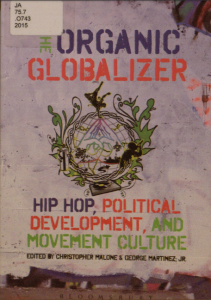“The Organic Globalizer: Hip Hop, Political Development, and Movement Culture,” edited by Christopher Malone and George Martinez, Jr., is a compilation of essays that explore the ways in which hip hop culture serves as an “organic globalizer.” In the opening chapter, Malone and Martinez define organic globalizer as a movement which “builds a network of grassroots institutions geared toward social justice and political participation both locally and globally” (Malone and Martinez, Jr., 5). Hip hop developed during the early 1970s “among African Americans and immigrant populations in the urban United States” (Flaherty, 131) and has ever since traveled throughout the world, giving other marginalized communities a voice to raise social awareness and promote change.
The authors explore hip hop as a “means of expression for groups that are historically marginalized and outside of traditional political, institutional access to power” (Flaherty, 131-32) from America’s inner-cities and industrial prison complex to the colonized lands of Palestine, Australia, Africa, and Latin America. From the socio-economic disparities and injustices endured by these transnational communities, the authors propose that “hip hop, rooted in a movement culture, has been an artistic medium used to foster awareness, build and transform social institutions, and/or encourage political activism in local communities that have largely found themselves marginalized” (Malone and Martinez, Jr., 15). Therefore, hip hop unites the struggles of international peoples and serves as a force for political engagement, cultural awareness, and social justice on a global scale.
In May 16, 2001, the United Nations sponsored and recognized hip hop as an international culture through the Hip Hop Declaration of Peace. This declaration lists 18 principles which “seek to maintain the dignity and respect of individuals, cultures, tribes, and peoples of the globe . . . [and to promote hip hop] as a veritable source of conflict resolution” (Malone and Martinez, Jr., 11). To honor the message of “The Organic Globalizer” and the forthcoming Hip Hop Awareness Week, I encourage you to visit the International and Area Studies Library to check out “The Organic Globalizer” and the rest of our collection and resources. And, make sure you watch the following videos by artists I consider organic globalizers: Aisha Fukushima, DAM, and Nomadic Massive.
Aisha Fukushima
Vocalist, speaker, RAPtivist, instructor and international artist Aisha Fukushima hails from Seattle, Washington/ Yokohama, Japan. She navigates and explores the intersections between hip hop and social justice through her project RAPtivism, public performances, and speeches. The following video further elaborates on her accomplishments and the work that she has done.
“Hip Hop Lives–Raptivism Around the World: Aisha Fukushima at TEDxSitka”
DAM
Da Arabian MC’s (Suhell Nafar, Tamer Nafar, Mahmoud Jreri) are known as the first Palestinian hip hop group from a neighborhood called Lyd/Lod. Their work speaks to the struggles of the Palestinian people living under occupation, challenging ethnic and cultural stereotypes, and raising social awareness. Recently, DAM added a new member to the group, Maysa Daw, and they have worked on a new project through a joint effort with the United Nations Population Fund (UNFPA) which addresses the oppression of patriarchal structures. Here is the group’s new video for their single “Who R You?”:
“#Who_You_R (Official Video)”
Nomadic Massive
Nomadic Massive a Montreal-based hip hop group composed of 8 members: Vox Sambou, Nantali Indongo, Lou Piensa, Waahli, Ali Sepu, Meryem Saci, Rawgged MC, and Butta Beats. This super, multicultural and multilingual group of artists conveys their messages in French, English, Creole, Arabic, and Spanish. They have given workshops and worked with international communities, like Haiti, Cuba, Brazil, etc. The following video speaks about the origins of the group and their work to empower and build sustainable communities through hip hop culture.
“TEDxConcordia – Nomadic Massive”
If you are interested in learning more, the following links will direct you to University of Illinois professors, and their curriculum vitas (CVs), for a list of interdisciplinary presentations and publications on hip hop culture.
Love. Peace. & Hip Hop.


